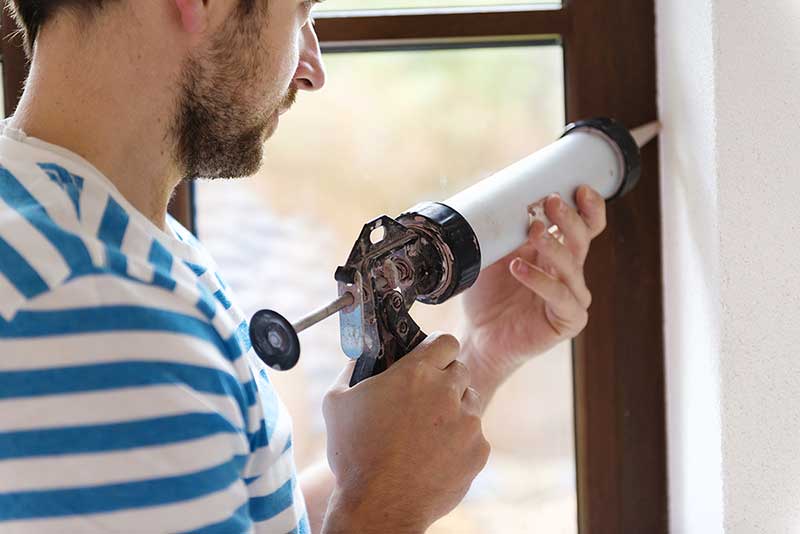Did you know that on average, heating and cooling costs account for just over half of a family’s overall utility bills? According to the U.S. Department of Energy, only 45% of a household’s electric bill is attributed to water, power, lighting, and appliances, etc. combined.

Even with climate change warming the country up from coast to coast, arguably the primary reason that heating and air conditioning cost so much is that a lot of warm or cool air is lost when it escapes through small cracks, holes, and spaces to the outside.
Here’s what you should know about a process called air sealing and how it can help you reduce the overall amount of energy you put into heating or cooling your home, thereby saving you time and money.
What Is Air Leakage?
When outside air seeps into your home and conditioned air uncontrollably escapes through cracks around doors, windows, and in your home’s foundation, you have air leakage.
When the weather is cold or windy, excess air can enter your home. When the temperature rises and the wind dies down, there’s a chance that not enough air will be able to get in, resulting in low indoor air quality.
Air leakage also leads to moisture issues and may have an effect on not only the longevity of your home’s structure but also your health and wellbeing. Sealing holes and gaps often prevents cold spots and drafts, which improves comfort.
What Is Air Sealing?
The comprehensive inspection of a home for outdoor air entry points and sealing of those exposure areas is known as air sealing. Air sealing can occur all over the home, from the home’s foundation and basement to the upper floor rooms and attic.
Weatherstripping and caulking detected air leaks are two basic and inexpensive air-sealing methods that can help noticeably reduce your energy bills in about a year or potentially less. Weatherstripping is used to seal moving components like doors and windows that open and close. Caulk, on the other hand, caulk is best used to seal gaps and holes in stationary house components such as around the frames an in the foundation.
Why Do People Air Seal Their Homes?
We’ve already established that the cost of heating and cooling your home is the vast bulk of your annual electricity bills. Consider how much additional money you’d have to pay if your house allowed cold air to seep in uncontrollably during the winter and hot air to undo your AC’s hard work during the summer.
For the same volume of treated air, your HVAC system will have to operate twice as hard. This impacts the longevity of your system and means you may need maintenance, repair, or a new installation sooner than you thought. More often than not, being proactive about air sealing your home is the best way to address the problem head-on before waiting for your energy bills to climb before something is done about it.
What Are the Benefits of AC Sealing?
There are numerous benefits to Massachusetts homeowners that have their homes air sealed, including but not limited to:
- Saving money and reducing the amount of energy your family consumes in your home. One of the biggest appeals of AC sealing is to save money on your overall energy costs. Many families blow their energy budgets in the summer when they crank the air conditioner up, or in the winter when they need more heat but have no backup system like an electric or wood burning stove.
- Ensuring that the ideal temperature is maintained in every area of your home.When you seal your home from drafts, you won’t notice walking through cold or hot spots where the air is coming into the house from outside. Your home will be a consistent temperature throughout, unless you’re using a ductless mini-split system that allows you to set up zoned heating and cooling.
- Reducing the amount of outside noise that enters your home.An often-overlooked benefit of air sealing your home is that it provides insulation against noise. If you live in a busy Boston neighborhood, a little extra protection against unexpected outdoor noises can be helpful.
- Discouraging the entry of rodents and insects. With fewer entry points around doors, windows, and your home’s foundation, you will notice fewer instances of insects and mice getting into your house, even if they did before. This helps improve the health and cleanliness of your home simply by refusing vermin refuge in between your walls.
- Improving humidity and air quality in the home. When outdoor air enters your house, you have little control over its temperature or humidity levels. Your HVAC system will have to work harder to bring the temperature back down to what you’ve set the thermostat to and if the leak is large enough, your system may end up working nonstop.
Contact Your Veteran Boston HVAC Provider at N.E.T.R., Inc. Today
At N.E.T.R., Inc., we understand how important managing your heating and cooling costs and your family’s overall energy consumption is. We also know how your HVAC system and problems within your home can impact how much energy you’re using on a daily basis to keep your home within a comfortable temperature and humidity range.
Our experienced Mitsubishi Electric Diamond Elite Certified contractors can help identify areas of your home that could be leaking hot or cold air and make recommendations on how those can be effectively and efficiently sealed. Contact our office today to learn more about the benefits of air sealing or to book a consultation with one of our trusted HVAC technicians by calling (781) 933-6387.
